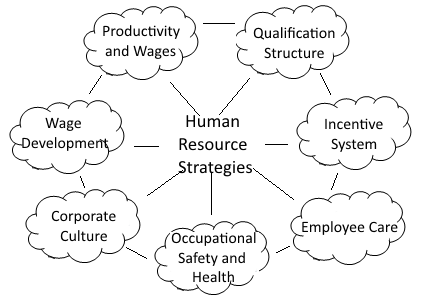Home
>
E-learning
> 4.2. Human Resources Strategy > 4.2.1. HR Strategy Content
4.2.1. HR Strategy Content
Formulating a comprehensive human resources strategy is typical in the SMEs sector for slightly bigger companies. However, every company can benefit from thinking about specific aspects of HR management more systematically, as these aspects shape the overall company culture as well as the company’s performance and competitiveness. In terms of an HR Strategy, it is beneficial to consider the following aspects (Hanzelková, Keřkovský, Kostroň, 2013):
 Human Resource Strategies (Hanzelková, Keřkovský, Kostroň, 2013), authors’ own processing
Human Resource Strategies (Hanzelková, Keřkovský, Kostroň, 2013), authors’ own processing
Like the marketing strategy, the table below presents a set of instructions on which aspects of the HR strategy should be taken into consideration.
| Strategic Aspects of Human Resources |
What to Consider: |
| Qualification Structure |
- Which job positions and how many employees will be needed to ensure efficient company operations with respect to costs, financial options etc.
- Which qualifications and qualities should employees have in terms of knowledge, skills, experience, as well as personal traits and their impact on the overall climate and culture of the company etc.?
- How to acquire such employees (from the job market, they will be trained by the company and if so, how, etc.)?
- How will our organizational structure be set up – will it be divided according to functional areas, divisional structure with geographic segmentation, product segmentation or another approach, while ensuring operational efficiency within the company?
|
| Incentive System |
- Will we create and implement an incentive system? How do we know what motivates individual employees?
- Have we created a motivational environment? Are individual team members satisfied? Are individuals also rewarded for team success? Do team members and teams feel supported?
- Will our incentive system be based on rewarding employees financially?
- If so, how will be the amount and general logic behind financial incentives be set for individual positions based on the workload and nature of these positions?
- Will we implement other types of incentives? If so, which ones??
- How will we evaluate our employees? Will we set performance targets? If so, how will we ensure that these targets are straightforward and attainable, i.e. motivational.
|
| Employee Care |
- Have we implemented a benefit program?
- Do we wish to or are we able to introduce a similar program?
- If so, how will this program be set up in terms of employee expectations, the need to solidify their loyalty and satisfaction, the company’s realistic financial options etc.? Apart from subsidizing meal vouchers, employee benefits usually include, for example, leisure activities, healthcare plans, vacation, as well as company items for both work and personal use, such as company car, cell phone (including special phone plans), and computers. Employee care may also include the work environment, working conditions, designated break spaces for employees (rehabilitation centres, gyms, saunas…), as well as work spaces, including their appearance, hygiene and tidiness.
- How will we monitor employee satisfaction and the general corporate climate?
- Employee care can also entail further education and training programs for employees. In this respect, it is advisable to consider the following:
- Whether or not to implement a program for further education/training
- If so, how should it be set up with regard to employee motivation and the needs of the company (developing core skills etc.)?
|
| Occupational Safety and Health |
- Does our line of work require special measures to be taken regarding the occupational health and safety of our employees?
- Is our line of work regulated by legislation, legal standards, or other regulations? If so, what does this imply regarding requirements for my company?
- Do our business operations comply with these legislative requirements?
- Are we doing anything to go beyond and exceed these requirements?
- Are we meeting our employees’ expectations in this regard?
|
| Corporate Culture |
- Have we solidified our corporate culture i.e. do we share the same values and “speak the same language”? Do we look up to the same people and practice the same rituals?
- Do we take part in activities outside of the work place?
- If so, are they in line with our intended strategy and will we continue to support and develop them?
- Or do I need to change or build an entirely new corporate culture because we currently do not have one? If so, what steps will I take to implement it?
|
| Remuneration and Wage Development |
- Does our company have a reward system for employees?
- Have we defined our reward strategy? If so, is it efficient?
- What are the key job positions in our company?
Which positions are easy or difficult to replace, and how should this be reflected in our reward system?
- How should the system generally be set up with regard to the market situation, the needs of my company and ensuring financial flexibility etc.?
|
| Productivity and Wages |
- Some of the fundamental questions are: What is our company’s current productivity situation like? What productivity levels should we attain with respect to our company’s competitiveness?
- Does the corporate culture support labor productivity?
- Have we streamlined our procedures, processes, operations and activities in the company?
|
 Human Resource Strategies (Hanzelková, Keřkovský, Kostroň, 2013), authors’ own processing
Human Resource Strategies (Hanzelková, Keřkovský, Kostroň, 2013), authors’ own processing

